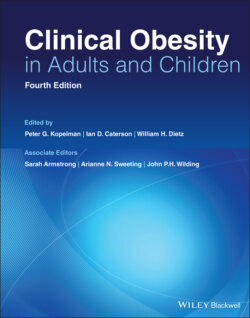Читать книгу Clinical Obesity in Adults and Children - Группа авторов - Страница 95
Education
ОглавлениеObesity is associated with less academic achievement, including poorer grades and lower college enrollment [43,44]. While some of these associations may be partially explained by socioeconomic status, they are also driven by weight bias and stigma [45].
Data from the Early Childhood Longitudinal Program‐Kindergarten (ECLS‐K) show evidence of weight bias in educator ratings of academic performance in youth from kindergarten through eighth grade. When comparing teacher assessments of students’ academic performance to objective measures (e.g. standardized test scores), obesity was more strongly associated with poor teacher ratings than with poor objectively measured performance [46]. Even after controlling for socioeconomic status and other environmental factors, youth with obesity were rated by teachers as performing poorer in reading and math than lower‐weight peers, but they did not perform significantly better or worse than these peers on standardized tests.
Additional analyses of the ECLS‐K data highlight the direct impact of childhood weight gain on academic ratings over time. Kenney et al. [47] examined weight changes, standardized test scores, and subjective teacher and student ratings of academic performance in 3362 children from fifth to eighth grade. Changes in BMI z‐score were not associated with a change in standardized test scores, yet they were significantly inversely associated with teachers’ subjective ratings of academic performance. Specifically, increases in BMI z‐scores were associated with decreased ratings for girls’ ability in reading and boys’ ability in math. These decreases in subjective ratings were even more pronounced if the child’s BMI z‐score already placed them in the “overweight” category at baseline. These discrepancies reveal potential bias in educators that skew teacher expectations about how well a child can perform, despite objective evidence of adequate performance.
Qualitative explorations of teacher ratings reveal specific weight‐based beliefs held by educators that may impact their students. Kenney et al. [48] interviewed 22 teachers in K‐12 schools and found that teachers expected youth with obesity to struggle academically. Teachers commonly attributed this difference to lower self‐esteem and consequent classroom disengagement. Some teachers also reported beliefs that poor nutrition and reduced physical activity contributed to the students’ obesity and poor academic performance. However, other teachers reported that their students with obesity demonstrated above‐average academic performance, which they attributed to the belief that their students with obesity had “worse social lives” and thus had more time to devote to academics. Altogether, teachers described negative assumptions about their students based solely on their weight. In addition, some teachers reported that dress codes were more strongly enforced for girls with obesity compared to their lower‐weight peers (e.g. shorts being too short or tank tops being “too revealing”), suggesting that disciplinary action may differ by weight status. Notably, several teachers also expressed concerns that school‐based health interventions may contribute to a weight‐stigmatizing environment.
A hostile academic environment due to weight‐based peer victimization (described in more detail below) can also negatively affect students’ engagement in school and impede learning. In a study of 1070 parents reporting on the experiences of their children, Krukowski et al. [44] initially found that overweight status significantly predicted poorer academic performance (i.e. grades) after controlling for gender, race, grade level, and enrollment in free lunch programs. However, weight‐based teasing was also associated with academic performance, and when teasing was added to the initial statistical model, weight status was no longer a significant predictor of academic performance. This suggests that weight‐based teasing may explain poor academic performance more so than weight status alone. Findings from a study of 394 high school students indicated that, for every incident of reported weight‐based victimization, the odds that students reported skipping school or having their grades harmed by this victimization increased by 5%, even after controlling for gender, age, race, grades, and weight [49].
In addition to academic performance, weight bias may also partially explain weight‐related disparities in academic advancement. In a study of 97 applicants to doctoral psychology programs, BMI was inversely associated with the number of graduate school offers received following in‐person interviews [50]. This effect was significant even after controlling for grade point average and was particularly strong for women. However, BMI was not associated with total offers when in‐person interviews were not conducted, suggesting that applicants with a higher weight were penalized only when they were visibly seen by the interviewers. Of note, applicants with higher BMIs had more favorable recommendation letters than lower‐weight peers, lending further evidence that the discrepancy in post‐interview admission offers was not likely due to differences in applicant qualifications.
The academic consequences of obesity may affect youth differentially by gender. Generally, weight‐related educational disparities are more pronounced for girls than boys [43]. This may be attributable, in part, to higher rates of weight‐based victimization among girls [44]. Poorer educational outcomes for female youth with a higher weight have been demonstrated from grade school through college and post‐graduate studies, such as lower elementary school test scores and course grades, lower subjective teacher ratings, and lower rates of college enrollment [43,44,51]. Race/ethnicity differences in academic outcomes related to weight have yet to be thoroughly explored. Preliminary evidence suggests that weight‐related academic disparities are consistent across race/ethnicity, though more data are needed to consider the impact of weight and race on academic outcomes using an intersectional framework [26,44].
